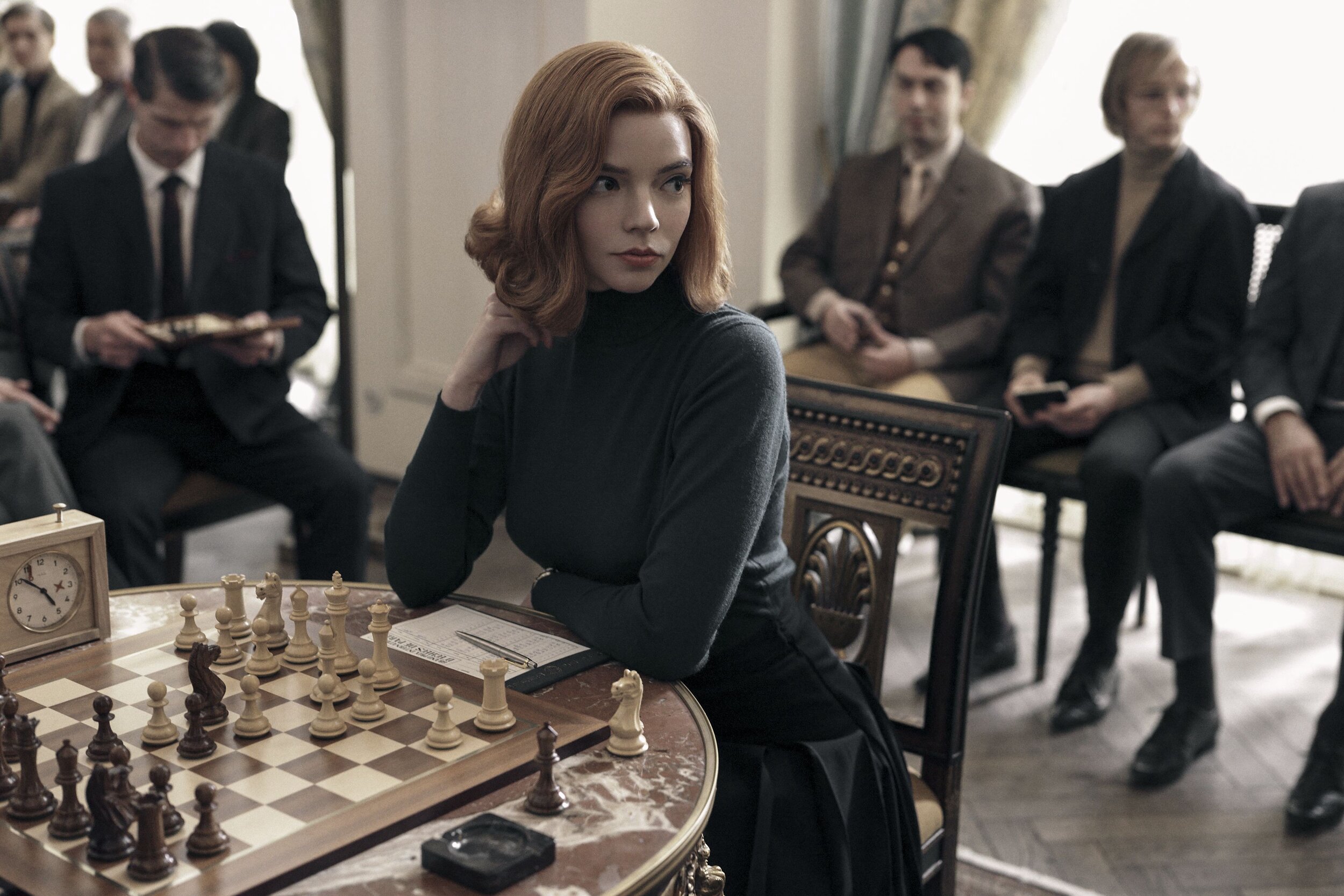The Queen’s Gambit is exactly what 2020 needed — but not for the reasons you think
Netflix’s ‘The Queen’s Gambit’. Pictured: Anya Taylor-Joy as chess-prodigy Elizabeth Harmon. Image from Wallpaper Access.
Within the first month of its release, Netflix’s The Queen’s Gambit has been nothing short of revolutionary. Receiving an impressive 62 million views within its first month on Netflix, the show has transformed the world of chess from a boring board-game into a cut-throat and competitive realm of kings and queens, trading knights for rooks on a chequered marble battlefield.
What accentuates the show’s attractiveness is the glitz and glamour in every scene. With diamond-encrusted chandeliers decorating championship halls and press conferences held in elegant hotel ballrooms, the miniseries’ effortless elegance transports viewers from the four walls of their domiciles into an untouchable world reserved only for child prodigies and chess grandmasters.
This portal is opened by the queen of chess herself, the show’s protagonist Beth Harmon. A world-renowned chess prodigy, Harmon is famed for her ruthlessness on the board, her opening attacks demoralising her opponents within minutes, paving the way for their imminent defeat.
One could easily praise The Queen’s Gambit for its escapism. After the horror-story that was 2020, the show provided a much-needed distraction from reality, absorbing us into a world contained within the 64 black and white squares of a chess board. However, while the effortlessly elegant show acts as a much-needed distraction, it also forces us to confront the uncomfortable parts of our own reality that we’ve been avoiding.
It sounds like a stretch, but here’s the parallel. The fascination with The Queen’s Gambit lies in the games of chess themselves, watching pieces travel across the board in sequences we might recognise but don’t understand: the Sicilian Defence, the English, the Four Knights Game. With each move cleverly calculated, either to attack or defend, it’s very easy to get sucked in.
Likewise, Harmon finds safety in being totally absorbed in the world of chess. Perhaps the most iconic line of the show, in an interview with Life Magazine she says:
“[Chess is] an entire world of just 64 squares. I feel safe in it. I can control it. I can dominate it. And it’s predictable, so if I get hurt, I only have myself to blame.”
The same can be said for the viewer’s choice to watch the show, or any show for that matter. They make the choices. They pick the shows, they choose the channels, and if they’re dissatisfied with their selections then they only have themselves to blame. There is a total absorption on both Harmon and the viewer’s part. But what happens when the entertainment is over?
Like the much recounted sense of loss viewers report when finishing their favourite TV series, as the screen turns to black they are faced with the choice of picking up the remote and finding another binge-worthy series, or getting up off the sofa and re-engaging with the outside world.
For many people in 2020, re-engaging with the world wasn’t a possibility. With the economy in turmoil and a pandemic bringing the world to its knees, the world outside the screen was bleak, dreary and depressing. Rather than continually squaring up to reality, many found comfort in the alternative realities contained within the television.
Likewise, in The Queen’s Gambit Harmon’s fluctuation between intensity and sedation is indicative of a desperate search for detachment. There’s no mistaking that she is a force to be reckoned with on the chess board — yet when the king has fallen and the thrill of the tournament is over, her only solace lies in the bottom of the bottle as she sedates what can only be described as a brilliant, yet troubled mind.
Having faced grief and abandonment over and over again, it’s unsurprising that Harmon is looking for a break from reality, much like the average viewer in 2020 looking to shut out torrent of bad news coming at them from every angle. As we watch Harmon try to dampen the piercing silence of grief and loss with playing and partying, we’re almost forced to confront our own behaviour, using television as a way to avoid the uncomfortable silences we are avoiding ourselves. So why was The Queen’s Gambit what 2020 needed?
The answer lies in the ending.
The miniseries ends in Harmon’s triumph, having conquered her long-standing rival Borgov, granting her the coveted title of World Chess Grandmaster. We are able to share that joy with her, knowing all too well that it is temporary. Harmon’s glory will come to an end much like Borgov’s did, and despite achieving legendary status, her battle to stay at the top will be just that: a battle. However, by clinching success we are able to revel in that sweet serendipitous moment with her, without regard for the future and the chaos it will bring.
While forcing us to confront our own numbness as the screen turns to black, The Queen’s Gambit promises us glimpses of glory in the future, all the while reminding us that at times the present, as raw and uncomfortable it can be, can be golden.


